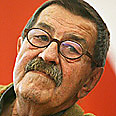
'Damaged reputation.' Grass
Photo: AFP
German Nobel literature laureate Gunter Grass hit back Thursday at what he called a "campaign" by critics of his poem accusing Israel of plotting Iran's annihilation and threatening world peace.
The 84-year-old sparked outrage at home and abroad Wednesday when he published "What must be said" in a newspaper in which he said he feared a nuclear-armed Israel "could wipe out the Iranian people" with a "first strike".
Israeli Prime Minister Benjamin Netanyahu described the poem Thursday as "shameful."
Related stories:
Grass, a longtime leftist activist, said in separate interviews that the media had piled on him without understanding his message and although he found the personal accusations against him "hurtful", he had no plans to back down.
"The tenor throughout is, 'don't focus at all on the content of the poem' but rather, conduct a campaign against me and claim that my reputation is now damaged for all time," Grass told public broadcaster NDR.
"I have noticed that in a democratic country with press freedom that people are expected to toe the line and that there is a refusal to address the content and the questions I raise here."
'Israel has a right to exist'
Grass said he was particularly stung by the widespread accusations of anti-Semitism against him in the German media.
"That is quite hurtful and not worthy of a democratic press," he said.
In a separate interview with public broadcaster 3sat, he said he was being "pilloried" but had "no plans to recant" what he said in the poem.
He acknowledged however that it would have been better not to speak of Israel but rather "the current government of Israel", he said, according to excerpts released by the channel.
He said a closer reader of the poem "would recognize my concern about the future of this country which has a right to exist".
Outraged commentators in Germany and Israel said Grass had offered up a one-sided portrayal of Israel as a bloodthirsty aggressor against Iran while dredging up anti-Jewish tropes in the nine-stanza prose-poem.
"The shameful comparison that Gunter Grass made between Israel and Iran, a regime which denies the Holocaust and calls for Israel's destruction, says very little about Israel and a great deal about Mr Grass," Netanyahu said in a statement.
"It is Iran, not Israel, which presents a threat to the world's peace and security. It is Iran, not Israel which threatens the destruction of other states."
Israel, the sole if undeclared nuclear power in the Middle East, has said it is keeping all options open for responding to Iran's program which it says is aimed at securing atomic weapons, posing an existential threat to the Jewish state.
Iran, whose President Mahmoud Ahmadinejad has repeatedly questioned Israel's right to exist, has denied that its sensitive nuclear work is aimed at making weapons.
Grass, author of the renowned anti-war novel "The Tin Drum", had pressed his country for decades to face up to its Nazi past.
But he shocked his admirers in 2006 when he admitted, six decades after World War II, that he had been a member of Hitler's notorious Waffen SS as a 17-year-old - a late revelation that undermined his until then substantial moral authority in Germany.
- Receive Ynetnews updates
directly to your desktop















